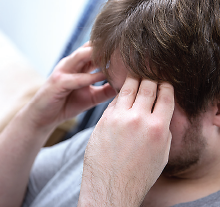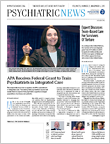Gene Polymorphisms Identified in Methadone Clearance
While methadone is an important opioid addiction medication, accidental overdose is a major concern. Overdoses occur in part because there is much variability in how quickly methadone clears from an individual’s system, so dispensing the right dose remains tricky.
Cytochrome P oxidases (CYPs) are key metabolizers of foreign chemicals, and a group at Washington University in St. Louis examined whether variations of the enzyme CYP2B6 contribute to methadone metabolism.
Compared with those without the polymorphism, volunteers with at least one copy of the CYP2B6*6 polymorphism showed lower methadone metabolism and clearance, with oral S-methadone clearance being the most reduced, followed by oral R-methadone, and lastly, methadone delivered intravenously.
The authors noted that genetic testing might be useful to identify subjects with lower metabolic profiles who are thus at a greater risk for methadone toxicity. In particular, the CYP2B6*6 variant is more prevalent in African Americans, they noted.
This study was published in Anesthesiology.
Kharasch E, Regina K, Blood J, Friedel C. Methadone Pharmacogenetics: CYP2B6 Polymorphisms Determine Plasma Concentrations, Clearance, and Metabolism.
Anesthesiology. Sep 19, 2015 [Epub ahead of print]
Light Therapy Reduces Depression in People With Cystic Fibrosis
Depression is a common symptom of cystic fibrosis, and it leads to worse outcomes when patients with the disease are hospitalized. Previous studies have shown the benefits of bright-light therapy in improving mood and reducing the length of stay of hospitalized patients, but it was unknown if these benefits would extend to patients with cystic fibrosis.
Researchers at Ohio State University examined the effects of light therapy on 30 patients with cystic fibrosis who were hospitalized following a pulmonary exacerbation (80 percent of whom had at least mild symptoms of depression upon admission). The patients used a light box for 30 minutes each day for seven consecutive days.
At the end of the week, the patients showed a significant decrease in their depressive symptoms as well as improvements in other quality-of-life indicators, including vitality and emotion. The light treatment was well tolerated and seemed to produce a shorter hospital stay—though the authors noted that length of stay was compared with that of a previous cohort of patients with cystic fibrosis.
The authors also cautioned that this pilot study, published in the Journal of Affective Disorders, had no control groups so the exact effects of light therapy as opposed to other aspects of the hospital stay remain unknown.
Kopp B, Hayes D Jr, Ghera P, et al. Pilot Trial of Light Therapy for Depression in Hospitalized Patients With Cystic Fibrosis.
J Affect Disord. Sep 28, 2015;189:164-168.
Naltrexone Offers Limited Benefit for People With Gambling Problems
Naltrexone is an approved medication for both alcohol and opioid addiction, and there is some evidence to suggest that it may also offer a viable option for treating behavioral addictions such as problem gambling.
To evaluate the effectiveness of naltrexone on gambling, researchers in Finland carried out a randomized, double-blind, placebo-controlled trial in 101 problem gamblers. The study participants received either 50 mg of naltrexone or placebo to use as needed when they felt an urge to gamble, along with psychosocial support for 20 weeks. The researchers then assessed the severity of the problem gambling, including money spent, gambling frequency, gambling urges, and emotional well-being.
They uncovered no significant outcome differences between the two groups, though they found a potential improvement with naltrexone on well-being in a subgroup of participants with a variant of the opioid receptor OPRM1. They suggested that larger studies are warranted to further evaluate the role of OPRM1 in problem gambling and possibly other behavioral addictions.
This clinical study was published in European Addiction Research.
Kovanen L, Basnet S, Castrȳn S, et al. A Randomised, Double-Blind, Placebo-Controlled Trial of As-Needed Naltrexone in the Treatment of Pathological Gambling.
Eur Addict Res. 2016; 22(2):70-9. Epub Sep 5, 2015.
Some First-Time Fathers May Experience Antenatal Depression
While the prevalence and risk of depression in pregnant women has been well documented, less is known of the risk of depression in expectant fathers.
A new study appearing in the American Journal of Men’s Health provides some of the first epidemiological details of antenatal paternal depression, finding that about 13 percent of first-time expectant fathers experienced elevated levels of depressive symptoms during their partner’s pregnancy.
These findings were based on a survey of 622 men in Quebec who completed online questionnaires measuring such factors as mood, physical activity, sleep, financial stress, and more during their partner’s third trimester.
The surveys revealed that depression rates were higher in men who experienced problems sleeping, had a family history of psychological difficulties, lower perceived social support, poorer marital satisfaction, and financial stress and whose partner was experiencing depressive symptoms.
“These are important signals because some of these factors may worsen in postpartum; certainly sleep will be compromised in the first years,” said study author Deborah Da Costa, Ph.D., an associate professor in the Department of Medicine at McGill University in a press release. “Antenatal depression is the strongest predictor for postnatal depression. So teaching fathers and screening … early on can be beneficial in terms of decreasing the risk or the continuation of depression postpartum.”
Da Costa D, Zelkowitz P, Dasgupta K, et al. Dads Get Sad Too: Depressive Symptoms and Associated Factors in Expectant First-Time Fathers.
Am J Mens Health. Sep 18, 2015 [Epub ahead of print]
Diversity of Intestinal Microbiome May Be Linked to Anorexia Nervosa
The intestinal microbiome has been linked with weight regulation, and new research published in Psychosomatic Medicine has now linked gut bacteria with extreme weight dysregulation.
A group from the University of North Carolina School of Medicine analyzed the fecal samples of 16 women with anorexia nervosa taken at admission to and discharge from an eating disorders clinic.
They found that the gut bacteria populations were far less diverse at admission than at discharge (intestinal bacterial diversity is a sign of good health). Patients that demonstrated the greatest improvement in mood over the course of their time at the clinic tended to have the most diverse gut microbiota.
However, the researchers did note that even at discharge, the bacterial diversity of the fecal samples of the anorexia patients was still lower than those taken from 12 healthy controls.
“We’re not saying that altering gut bacteria will be the magic bullet for people with anorexia nervosa,” said lead author Ian Carroll Ph.D., in a press release. “Other important factors are at play, obviously. But the gut microbiota is clearly important for a variety of health and brain-related issues in humans. And it could be important for people with anorexia nervosa.” ■
Kleiman S, Watson H, Bulik-Sullivan E, et al. The Intestinal Microbiota in Acute Anorexia Nervosa and During Renourishment: Relationship to Depression, Anxiety, and Eating Disorder Psychopathology.
Psychosom Med. Oct 1, 2015 [Epub ahead of print]





